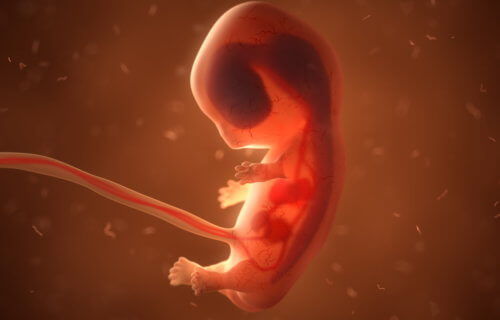CAMBRIDGE, England — Taking vitamin C can protect babies before they are even born from losing their memory later in life, scientists believe. The tablets ensure babies’ brains develop properly, even if their oxygen supply is cut short, according to a new study.
Low oxygen in the womb, known as chronic fetal hypoxia, is one of the most common complications women face during pregnancy. It is usually diagnosed when routine ultrasounds reveal the baby is not growing properly. The condition is linked to a number of other conditions, such as pre-eclampsia, infection of the placenta, gestational diabetes or maternal obesity.
Now, University of Cambridge researchers have found it also reduces the number of nerve cells and connections in the child’s brain. This undermines their ability to form long lasting memories later in life and speeds up the aging process.
Taking high-doses of vitamin C tablets or vitamin C serum, an antioxidant, could prevent this from happening, the researchers say.
“It’s hugely exciting to think we might be able to protect the brain health of an unborn child by a simple treatment that can be given to the mother during pregnancy,” says study leader Dino Giussani, a professor from Cambridge’s Department of Physiology, Development and Neuroscience, in a statement.
‘Preventative medicine even before birth protects long term brain health’
The researchers tested their memory drug on pregnant rats that were exposed to different levels of oxygen. One group was kept in ambient air with 13 percent oxygen, causing chronic fetal hypoxia. The others were housed in normal conditions (21 percent oxygen). Half the rodents in each group were given vitamin C in their drinking water, a well-established and used antioxidant.
After birth, the newborns were raised to four months old, equivalent to early adulthood in humans. Study authors then performed various tests to assess their movements, anxiety, spatial learning and memory.
Rats that had been deprived of oxygen in the womb took longer to carry out memory tasks, and did not remember things as well. But those that were given a vitamin C boost throughout their mothers’ pregnancy were just as sharp as the others, the researchers found.
The researchers say rats born to mothers with chronic fetal hypoxia had a less developed hippocampus, part of the brain associated with forming memories. Deeper analysis reveals the condition led to a higher production of reactive oxygen species, called “free radicals,” in the mother’s placenta.
Normally the body keeps the level of free radicals in check by internal antioxidant enzymes. But excess free radicals overwhelmed these natural defenses and damaged the placenta in a process called “oxidative stress.” This reduced the blood flow and oxygen delivery to the developing baby, the researchers say.
“Chronic fetal hypoxia impairs oxygen delivery at critical periods of development of the baby’s central nervous system,” explains co-author Dr. Emily Camm. “This affects the number of nerve connections and cells made in the brain, which surfaces in adult life as problems with memory and an earlier cognitive decline.”
The findings add to a growing body of research which suggests the interaction between our genes and lifestyle plays a role in determining our risk of disease as adults, like attention deficit disorders and Alzheimer’s disease.
“In medicine today there has to be a shift in focus from treatment of the disease, when we can do comparatively little, to prevention, when we can do much more,” adds Giussani. “This study shows that we can use preventative medicine even before birth to protect long term brain health.”
The research is published in the journal FASEB J.
SWNS writer Tom Campbell contributed to this report.
